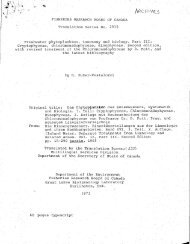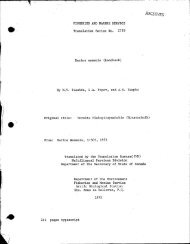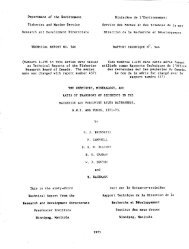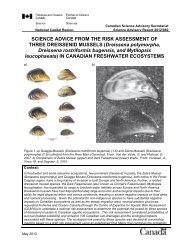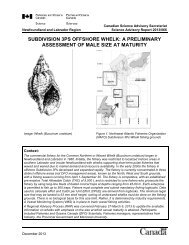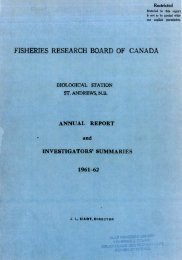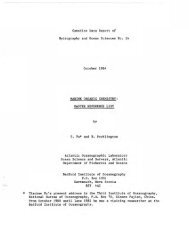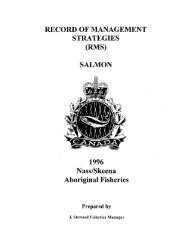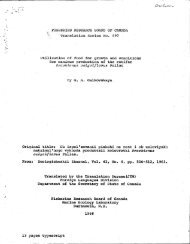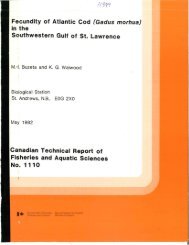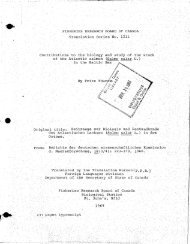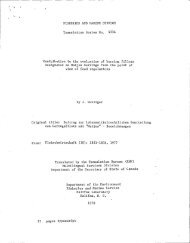You also want an ePaper? Increase the reach of your titles
YUMPU automatically turns print PDFs into web optimized ePapers that Google loves.
35<br />
distributed from Canada, which had a tendency to depreciate what had been done in<br />
fish culture, not only in Europe, but in the United States. It has been said that fish<br />
culture was only an experiment, and had not been attended with commercial success<br />
he, however, wished to say that it was in no sense an experiment, but that in the<br />
United States and in Canada it had been a decided success, and was so recognized by,<br />
everyone. It was not likely that the American Congress or Canadian Government<br />
would, for a period of twelve years, keep on making annual appropriations for fish<br />
culture if they were not satisfid that it was not only a success from a scientiflo.<br />
atandpoint, but a success from a commercial point of view. In the United States<br />
the general government had appropriated up to 1883 more than a $1,000,000, and<br />
the individual states a sum almost as great. Up to 1798 large numbers of salmon<br />
were caught in the Connecticut River, but until 1870 the fish disappeared entirely<br />
from the river; and until 1875 no salmon whatever were seen in the river. In 1875,<br />
however, the salmon began to appear and this was the direct result of the planting<br />
of a large number of young fry in that river some years previously. Then again,<br />
in the cage of the Sacramento River in California, where about two million young<br />
fish were planted yearly, the catch had increased in five years from five million<br />
pounds to fifteen million pounds, and in 1881 there were more fish than could be<br />
utilized by all the canning establishments on the river. He would not proceed with<br />
the multiplication of examples, but would refer to the fact that the fish in the<br />
Detroit River, where the United States and Canada had estabtisbd hatcheries, had<br />
been increased, and the supply immensely improved * * * c *<br />
Shaji, which four or five years before were selling for $1.00 a pair, and beyond the<br />
reach of the poor people, became so cheap and common that they could be bought<br />
for 25 cents a pair, which was entirely the result of fish culture.<br />
"Prof. Baird was not an enthusiast, but a man possessing the widest general<br />
knowledge of natural laws, whose sound judgment and experience had enabled him<br />
to take up the work of fish culture, and carry it on, on an immense scale in the<br />
United States. People were sometimes dissatisfied because fish were sometimes<br />
planted in streams, and nothing was heard of them afterwards; but it was the theory<br />
of the Commission and of the Government that it was a proper thing to make<br />
experiments, and if they happened to be unsuccessful there was so much ground<br />
eliminated over which it was unnecessary to go again. He thought the experiments<br />
which had been successful, ought to be allowed to balance those which had not.<br />
Experiments in fish culture in Europe, especially in Holland and Germany, had<br />
yielded exceedingly promising results * * *<br />
"It seemed to him that the Canadian Department of Marine and Fisheries was.<br />
one of the most valuable organizations in the world, and that their system of<br />
gathering statistics was one which other countries ought to study with a great deal<br />
of care. In the United States they had nothing of the kind * * * *<br />
Another matter which he looked upon with admiration was the great progreas<br />
Canada had made in fish culture during the past number of years, and more<br />
especially under the direction of Mr. Wilmot, who was one of the pioneers of fish<br />
culture in America."<br />
CONCLUSION.<br />
In concluding this report upon fish cultural operations as carried on during the<br />
past year under the authority of your Department of Fisheries, in the Government<br />
of Canada, it is gratifying for me as your superintendent of the work, to state that<br />
the several hatchery establishments with their apparatus, and general appliances are<br />
in a good working condition; that the out-put of young fish from them during the<br />
past season has been very large, and their distribution in the many waters of the<br />
country has been performed with safety and satisfaction; and that the present crop.<br />
of eggs now undergoing incubation in the several hatcheries present a healthy and<br />
vigorous appearance. This state of affairs, together with the numerous evidences of<br />
success which have been voluntarily given by many parties engaged in the fishing



